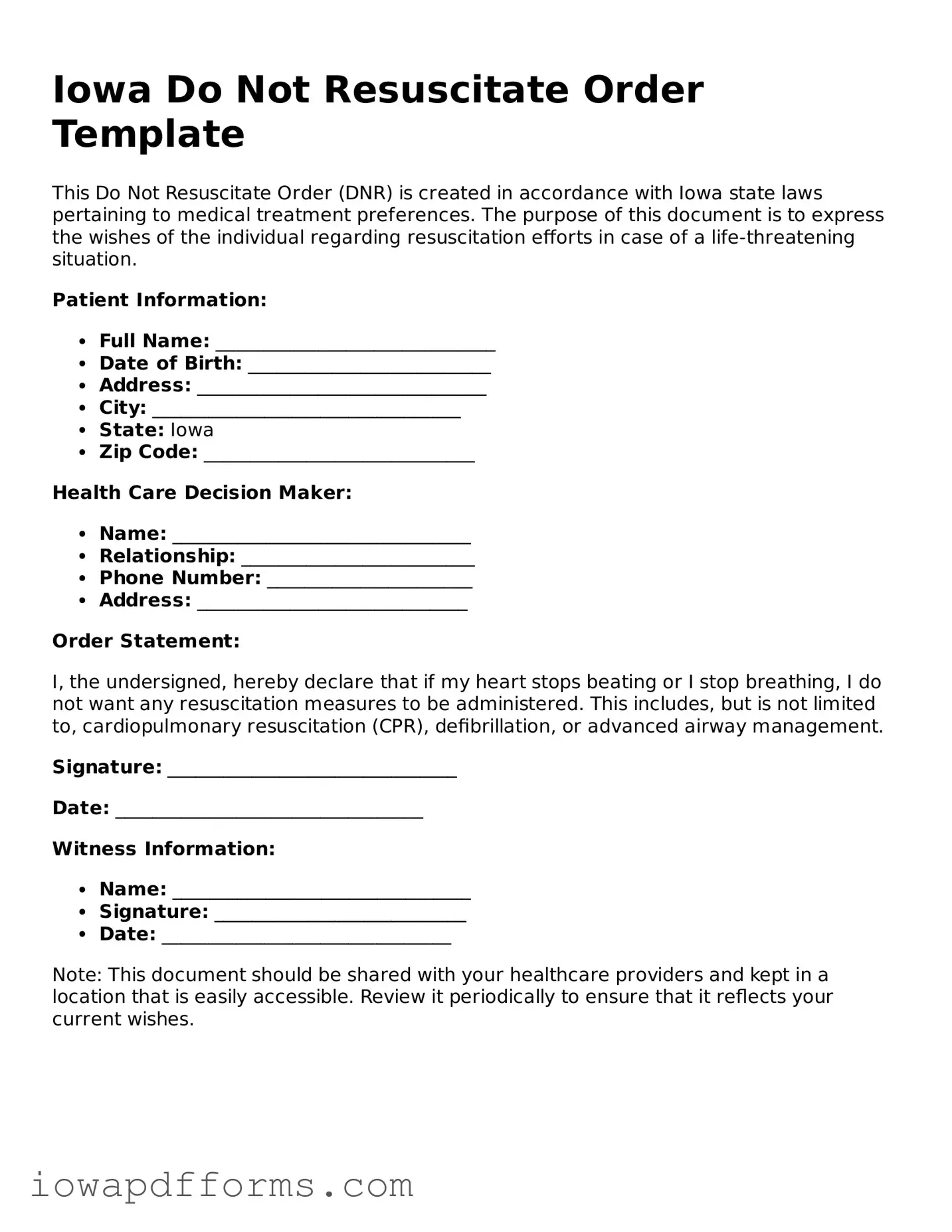The Iowa Do Not Resuscitate (DNR) Order form shares similarities with the Advance Directive. Both documents serve to express an individual's healthcare preferences in situations where they cannot communicate their wishes. An Advance Directive typically includes instructions regarding various medical treatments, including resuscitation efforts, while the DNR specifically focuses on the decision to forego resuscitation in the event of cardiac or respiratory arrest. This alignment helps ensure that a person's end-of-life care aligns with their values and desires.
Another document akin to the Iowa DNR Order is the Physician Orders for Life-Sustaining Treatment (POLST) form. Like the DNR, the POLST is a medical order signed by a physician, but it encompasses a broader range of medical interventions. The POLST allows individuals to specify their preferences for various treatments, including resuscitation, mechanical ventilation, and feeding tubes. This comprehensive approach enables healthcare providers to follow the patient’s wishes more closely in emergencies.
The Living Will is also comparable to the Iowa DNR Order. A Living Will outlines an individual’s preferences regarding life-sustaining treatment in the event of terminal illness or irreversible condition. While the DNR focuses specifically on resuscitation efforts, the Living Will addresses a wider array of medical decisions. Both documents aim to ensure that a person's healthcare choices are respected when they are unable to communicate their wishes.
A Colorado Last Will and Testament form is a legal document that outlines how a person's assets and responsibilities should be handled after their death. This essential tool ensures that your wishes are honored and that your loved ones are taken care of according to your preferences. Understanding its components and requirements can help you create a will that reflects your intentions clearly and effectively. You can find more information by visiting this Last Will section.
The Health Care Power of Attorney (HCPOA) shares a connection with the Iowa DNR Order in that it designates an individual to make medical decisions on behalf of someone else. While the DNR specifies the wish to forgo resuscitation, the HCPOA allows the appointed agent to make decisions based on the patient's preferences, including whether to initiate or withhold resuscitation. This relationship emphasizes the importance of having clear communication about healthcare preferences.
The Do Not Intubate (DNI) order is another document that aligns with the Iowa DNR Order. A DNI specifically instructs healthcare providers not to perform intubation in the event of respiratory failure. While the DNR focuses on cardiac arrest, the DNI addresses respiratory issues. Both documents reflect a patient’s desire to avoid aggressive life-saving measures and support the principle of respecting patient autonomy.
Similar to the Iowa DNR Order, the Comfort Care Order emphasizes the provision of comfort rather than aggressive treatment. This document instructs healthcare providers to prioritize palliative care measures when a patient is nearing the end of life. While the DNR explicitly states the wish to avoid resuscitation, the Comfort Care Order focuses on alleviating suffering and ensuring dignity in the dying process.
The Medical Order for Scope of Treatment (MOST) form is another document that parallels the Iowa DNR Order. The MOST form is designed for patients with serious illnesses and outlines their preferences for various medical interventions, including resuscitation. Like the DNR, it is a physician-signed order that guides healthcare providers in aligning treatment with the patient’s wishes during critical situations.
The Mental Health Advance Directive is similar in concept to the Iowa DNR Order, as it allows individuals to express their treatment preferences in mental health crises. While the DNR addresses physical health decisions, the Mental Health Advance Directive provides guidance on psychiatric treatment, including hospitalization and medication preferences. Both documents empower individuals to maintain control over their healthcare choices during vulnerable times.
The End-of-Life Care Plan is also akin to the Iowa DNR Order, as it outlines an individual’s preferences for care during their final days. This plan may include directives about resuscitation, pain management, and other critical care decisions. By clearly articulating these preferences, individuals can ensure that their values are honored as they approach the end of life.
Finally, the Palliative Care Plan shares similarities with the Iowa DNR Order. This document focuses on providing relief from the symptoms and stress of serious illness, prioritizing quality of life over aggressive treatment. While the DNR specifically addresses resuscitation, the Palliative Care Plan encompasses broader aspects of care, ensuring that individuals receive compassionate support aligned with their wishes.

